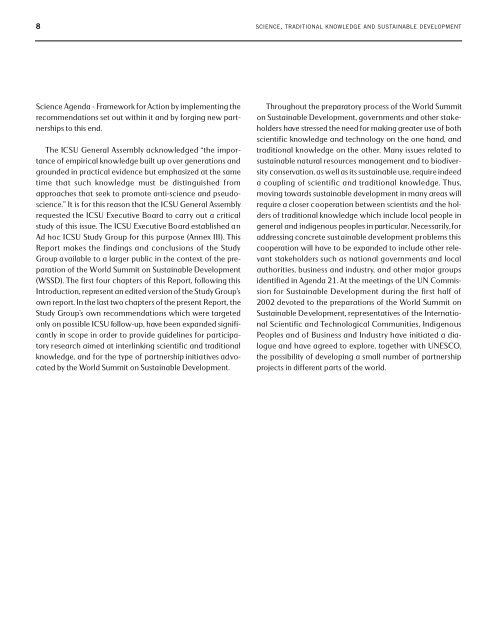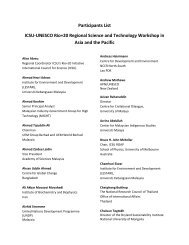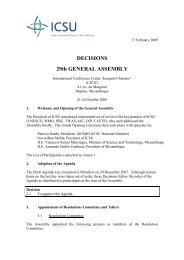Science, Traditional Knowledge and Sustainable Development
Science, Traditional Knowledge and Sustainable Development
Science, Traditional Knowledge and Sustainable Development
Create successful ePaper yourself
Turn your PDF publications into a flip-book with our unique Google optimized e-Paper software.
8<br />
<strong>Science</strong> Agenda - Framework for Action by implementing the<br />
recommendations set out within it <strong>and</strong> by forging new partnerships<br />
to this end.<br />
The ICSU General Assembly acknowledged “the impo rtance<br />
of empirical knowledge built up over generations <strong>and</strong><br />
grounded in practical evidence but emphasized at the same<br />
time th at such knowledge must be disti n g ui shed fro m<br />
a p p roa c h es th at seek to pro m o te an ti - s c i e n ce <strong>and</strong> pseudoscience.”<br />
It is for this reason that the ICSU General Assembly<br />
re q u es ted the ICSU Exe cutive Board to car ry out a criti ca l<br />
study of this issue. The ICSU Executive Board established an<br />
Ad hoc ICSU Stu dy Group for this pur pose (Annex III). This<br />
Re port makes the findings <strong>and</strong> co n c l usions of the Stu dy<br />
Group available to a larger public in the context of the preparation<br />
of the World Summit on <strong>Sustainable</strong> <strong>Development</strong><br />
(WSSD). The first four chapters of this Report, following this<br />
Introduction, represent an edited version of the Study Group’s<br />
own report. In the last two chapters of the present Report, the<br />
S tu dy Gro u p ’s own re co m m e n d ations which we re targ e te d<br />
only on possible ICSU follow-up, have been exp<strong>and</strong>ed significan<br />
tly in sco pe in order to provide gui d e l i n es for par ti c i patory<br />
research aimed at interlinking scientific <strong>and</strong> traditional<br />
knowledge, <strong>and</strong> for the type of partnership initiatives advocated<br />
by the World Summit on <strong>Sustainable</strong> <strong>Development</strong>.<br />
S C I E N C E, T R A D I T I O N A L K N O W L E D G E A N D S U S TA I N A B L E D E V E L O P M E N T<br />
Throughout the preparatory process of the World Summit<br />
on <strong>Sustainable</strong> <strong>Development</strong>, governments <strong>and</strong> other stakeholders<br />
have stressed the need for making greater use of both<br />
s c i e n ti fic knowledge <strong>and</strong> te c h n ol ogy on the one han d, an d<br />
tra d i tional knowledge on the oth e r. Many issues re l ated to<br />
sustainable natural resources management <strong>and</strong> to biodiversity<br />
conservation, as well as its sustainable use, require indeed<br />
a co u pling of scienti fic <strong>and</strong> tra d i tional knowledge. Thus,<br />
moving towards sustainable development in many areas will<br />
require a closer cooperation between scientists <strong>and</strong> the holders<br />
of traditional knowledge which include local people in<br />
general <strong>and</strong> indigenous peoples in particular. Necessarily, for<br />
addressing concrete sustainable development problems this<br />
cooperation will have to be exp<strong>and</strong>ed to include other relevant<br />
sta ke h ol d e rs such as national governments <strong>and</strong> loca l<br />
a uth o r i ti es, bus i n ess <strong>and</strong> indus try, <strong>and</strong> other major gro u p s<br />
identified in Agenda 21. At the meetings of the UN Commission<br />
for Sus tai n a ble <strong>Development</strong> during the fi rst half of<br />
2002 devo ted to the pre parations of the World Summit on<br />
<strong>Sustainable</strong> <strong>Development</strong>, representatives of the International<br />
Sc i e n ti fic <strong>and</strong> Te c h n ol og i cal Co m m un i ti es, Indigenous<br />
Pe o pl es <strong>and</strong> of Bus i n ess <strong>and</strong> Indus try have initi ated a dial<br />
ogue <strong>and</strong> have agreed to expl o re, tog e ther with UN ESCO,<br />
the po s s i b i l i ty of developing a small num ber of par tn e rsh i p<br />
projects in different parts of the world.




